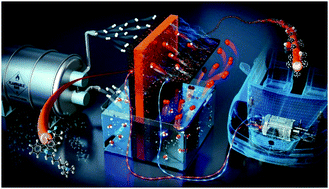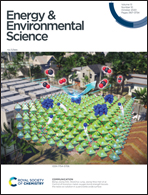Poly(carbazole)-based anion-conducting materials with high performance and durability for energy conversion devices†
Abstract
Anion conducting polymers (ACPs) are essential materials for alkaline electrochemical energy technology such as anion-exchange membrane fuel cells (AEMFCs) and water electrolysers (AEMWEs). The aforementioned polymers are promising alternatives for proton exchange membrane-based systems due to the possibility of using platinum group metal-free electrocatalysts. However, there are still no reliable ACPs possessing the desired performance and stability, which is a major challenge for developing alkaline energy systems. Herein, we highlight an anion-exchange membrane and ionomer based on quaternised poly-carbazole (QPC-TMA) with a rigid ether-free and curved backbone structure comprised of carbazole monomers. The developed ACP exhibits excellent ionic conductivity, as well as chemical and mechanical stability. Moreover, the AEMFC using QPC-TMA shows excellent performance (1.61 W cm−2) compared with the other best-performing AEMFCs. In addition, the AEMWE using QPC-TMA demonstrates outstanding stability and state-of-the-art performance (3.5 A cm−2 at 1.9 V), which is the first report of an AEMWE that outperforms the best-performing proton-exchange membrane water electrolysers.



 Please wait while we load your content...
Please wait while we load your content...